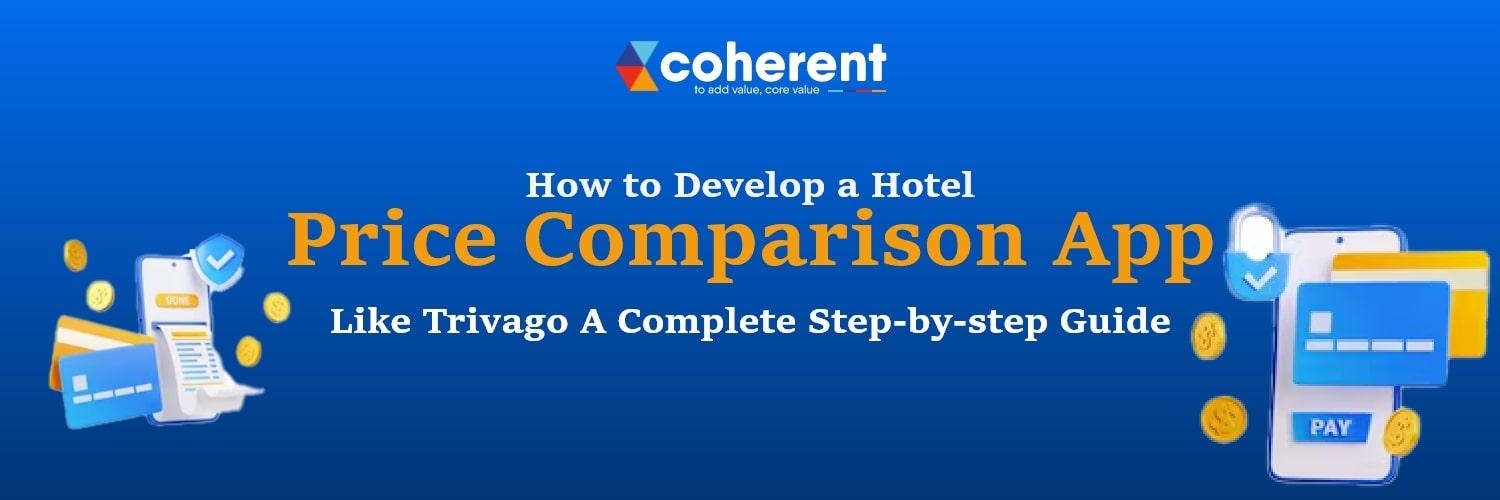How to Develop a Hotel Price Comparison App Like Trivago? A Complete Step-by-Step Guide

Travellers prefer systems that provide the best value for their investment in today's digitally first society. This is precisely what hotel price comparison apps do, enabling customers to instantly check room costs across various booking sites. By providing transparency and choice on a single platform, these apps—like Trivago—have completely changed the way people plan their trips.
Price comparison apps have grown indispensable due to the rising frequency of travel, particularly with Gen Z as well as millennial. More than 60% of consumers in the vacation booking market say they prefer to make hotel reservations through mobile applications. Through compiling information from hundreds of different booking websites and presenting competitive rates, user reviews, as well as hotel services in one location, apps such as Trivago meet this demand. It's crucial to comprehend this influence if you want to create an online reservation app like Trivago which is often considered a best price comparison app.
According to Allied Market Research Inc., the worldwide online travel booking industry is expected to increase at a CAGR of 9.7% and approach $1.5 trillion by 2030. Companies that compare hotels are becoming increasingly popular as a result of this increased tendency. Startups as well as travel companies are investigating the price comparison app distributor concept as a result of the demand for these apps. Creating an app similar to Trivago not only satisfies user wants but also creates profitable income opportunities via sponsorships and affiliate advertising. It is therefore a profitable booking online app model.
How Trivago Works?: Business & Functional Model
Trivago, which uses a complex yet efficient business model, provides a shining example of an adept hotel cost comparison website. The hospitality aggregator business model is what Trivago employs. Instead of making reservations directly, it collects data from a number of third-party booking platforms, such as Agoda, Expedia and Booking.com. Users are sent to the partner networks to guarantee a seamless booking experience.
Trivago's primary revenue stream is the Cost-Per-Click (CPC) model, in which website partners pay each time a user reads content on their platforms. It also provides affiliate money when customers use redirection networks to make appointments. In addition to booking portals, hotels might additionally decide to employ sponsored search results or display advertisements to increase revenue. Trivago's business plan offers an appealing opportunity with scalable growth potential, much like a best booking system app.
Read More: The Ultimate Guide to Hotel Booking App: Features, Benefits, and Development Insights
Key Features of a Hotel Price Comparison App
An extensive feature set intended to improve user experience and expedite hotel booking is what distinguishes a successful hotel pricing comparison app. Some of these features are mentioned below:
Filter-Based Hotel Search
A strong search feature is the foundation of any such program. It needs to be simple for customers to look for hotels by the number of visitors, check-in and check-out dates as well as route. Strong filtering features are crucial because they let customers focus on searching by housing type, desired position, cost range as well as particular features.
Comparison of Prices from Several Sources
The primary proposition for value is this. To enable users to quickly find the best deal, the smartphone application has to clearly show rates for the identical hotel from multiple travel agent sites (OTAs) and straight hotel sites. The cheapest price ought to be clearly displayed in the way it is presented.
Integration of Interactive Maps
The ability to represent hotel locations in connection with landmarks, tourist attractions or specific areas is a crucial component of map connectivity. On a map, visitors should be allowed to browse hotels straight away, view their rates and interactively filter findings when they zoom as well as pan.
Comprehensive Hotel Information
After choosing a hotel, thorough information is crucial. This comprises exhaustive descriptions of the accommodation as well as its offerings, a comprehensive list of services, excellent photographs of the rooms and infrastructure and important details like cancellation procedures as well as check-in/check-out timings.
User Evaluations and Scores
Genuine user evaluations and ratings are effective instruments for making decisions. In addition to displaying averaged ratings, the application should let users read in-depth evaluations that provide information about other tourists' satisfaction with sanitation, place, service and overall value for price.
Redirection of In-App Reservations
The app must smoothly direct users towards the partnering website (OTA or hotel's official site) so that they may finish their hotel booking without actually confirming reservations. The chosen hotel and cost should be maintained during this seamless and dependable redirection.
Push Alerts for Sales and Discounts
Push alerts are a great way for keeping users updated and involved. These can notify customers of price reductions for hotels they have looked at, customized offers based on their past searches or special discounts for well-liked locations.
Accounts for Users and Wishlists
Individualized encounters are made possible by letting people create accounts. Users can store places they are thinking about using features like "wishlists" and "favourites," which makes it simple to go back and compare possibilities later. Furthermore, search settings can be preserved for future use by creating an account.
Support for Multiple Languages and Currencies
Connectivity with many languages and denominations is essential for a worldwide audience. To improve availability as well as user convenience, the application should recognize or let users choose the language they like and show pricing in the currency of their nation.
Step-by-Step Development Process
For developing a complex hotel price comparison app like Trivago, it takes a methodical approach for making sure that all necessary stages are met with care. At Coherent Lab, we implement a tried-and-true process to make such complex solutions a reality.
Analyzing Competitors and Conducting Market Analysis
Comprehensive market study is conducted in the first step to comprehend target statistics, travel patterns and contemporary market dynamics. At the same time it is critical to conduct a comprehensive competition analysis of the current hotel price comparison apps. This aids in determining their advantages, disadvantages and areas in which your app can stand out from the competition.
Define Features & Functional Scope
The next stage is to precisely describe the application's key characteristics and full functional range according to market analysis. This entails listing all of the features (search, filters, comparison, map integration, etc.) and ranking them according to user requirements and corporate goals.
Select a Monetization Plan
Establishing the monetization plan is essential before development starts. As previously mentioned, this may entail payment for affiliate promotion, a CPC method or a mix of these. The architecture of partner connections and user flows is guided by an easily understood revenue model.
Create UI/UX
In order an app to be user-friendly and captivating, User Interface (UI) as well as UX (User Experience) designs are essential. These early prototypes help ensure a seamless and enjoyable experience by assessing user interactions and gathering initial feedback too. We stress this important stage as a top mobile app development company in USA.
Backend & Frontend Development
The app's foundation is constructed here. Backend development involves creating database systems, server-side logic and APIs that power the application. On the other hand, frontend development focuses on designing a responsive and visually engaging user interface for both Android and iOS platforms too. Hire a cross platform app development company in USA for comprehensive solutions.
Third-party API Integration
Combining a booking web app with many third-party APIs including direct hotel booking systems as well as virtual travel agents (OTAs) is essential. This forms the foundation of the app's data aggregation capabilities, allowing it to fetch up-to-date prices, availability and hotel details. This allows an efficient booking management app functionality.
Testing
Thorough testing cannot be compromised. This consists of performance evaluation to ensure the app is quick, responsive as well as extensible under different weights; security checks to safeguard user personal information and avoid weaknesses; along with functional testing to make sure that all functions work as planned.
Launch on App Stores
The software is ready for release on the two main app stores, Google's Play Store as well as the Apple software Store, after it has been extensively tested and improved. This entails creating captivating screenshots as well as explanations, improving app store listings (ASO) as well as adhering to platform-specific rules. Make sure the firm you're searching for prioritizes this launch process if you've been looking for an iOS app development company in USA.
Marketing & User Acquisition
The launch is only the first step. To draw in and keep consumers, a strong advertising and customer acquisition plan is necessary. To increase accessibility, this may involve influencer partnerships, social media advertising, digital marketing initiatives as well as app store optimization (ASO).
Also Read: Comprehensive Guide to Travel App Development: Features, Trends, and Costs
Conclusion
There is no denying the huge commercial potential of hotel price comparison apps is driven by the growing demand for easy-to-use, transparent booking options as well as the worldwide travel industry. By providing extensive options that save customers time and money, such platforms open up substantial revenue sources and build priceless trust. It's not simply trendy for travel companies interested in this profitable industry to make investments in a strong comparison app; doing so is strategically necessary to gain market dominance and foster enduring customer loyalty. Working with Coherent Lab LLP, a seasoned android app development company in USA guarantees the creation of adaptable and high-quality applications, setting up your business for unparalleled achievement in this ever-changing digital environment.
Frequently Asked Questions (FAQs)
Q1. How does Trivago actually collect hotel prices?
Online travel agencies such as Agoda, Booking.com and Expedia provide APIs (Application Programming Interfaces) that Trivago uses to collect hotel rates too. Through such APIs, the application may retrieve real-time information from partner sites like hotel information, rates and available rooms.
Q2. Do I need partnerships with OTAs to start?
Yes, one must have affiliation agreements or relationships with OTAs in order to get hotel offerings and prices in a reliable and lawful manner. In addition to giving you accessibility to the company's APIs, these collaborations could involve revenue share schemes like affiliate commissions.
Q3. How long does it actually take to build such an app?
With respect to characteristics, number of employees and complexity, developing a hotel price comparison app could require four to six months. Planning, designing, developing, integrating other parties and testing are all included.
Q4. Can I launch with limited features?
Of course. Start by developing a Minimum Viable Product (MVP) that has essential functions like price comparison, hotel searching and booking confirmation. In subsequent upgrades, users can include advanced capabilities like maps, notifications and wishlists.
Q5. How do websites like Trivago make money?
Trivago makes money from affiliate payments on fulfilled reservations, Cost-Per-Click (CPC) from online travel businesses and sponsored pages or paid ads from lodging establishments.


 +91 774-202-1725
+91 774-202-1725
 +1 (945) 3387904
+1 (945) 3387904
 business@coherentlab.com
business@coherentlab.com +49 15223341304
+49 15223341304 UK
UK

